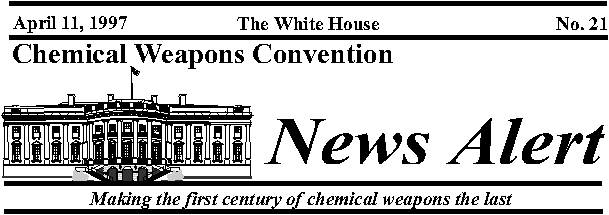This is the fourth in a series of News Alerts that look at the facts not
the fictions, about the Chemical Weapons Convention. Over the past three
and a half years, the Senate has held 16 hearings on the treaty. The
Administration has conducted dozens of briefings for Senators and their
staff, and provided the Senate more than 1,500 pages of information for the
record on the CWC.
The Verification Fiction: The treaty is unverifiable.
The Facts:
- Opponents of the CWC would make the perfect the enemy of the good.
Verification is never perfect -- but perfection is the wrong standard.
We have laws on the books that prohibit tax evasion or burglary or murder not because
they are guaranteed to prevent these acts, but because such laws make crimes less likely
to occur. Similarly, the CWC strengthens our hand against chemical weapons
cheaters -- without it we have no hand at all, for chemical weapons are perfectly legal
to make and prepare for use. And significant violations will be more readily detected because
of the treaty�s verification regime.
- The CWC is the most extensive arms control treaty yet. Its inspectors will have the
right to conduct short-notice and challenge inspections, coupled with access to inspection
technologies that will pose important new barriers to cheating. The treaty�s verification
provisions cover every aspect of production, stockpiling, transfer and use. The treaty also
ties the United States into global verification networks and strengthens our access to
information about other countries. It gives us new tools to deal with problems we must face
with or without the CWC -- the threats of chemical weapons proliferation and chemical
weapons terrorism.
- The military use of chemical weapons typically requires significant testing, equipping and
training of forces that will be more difficult to hide in the face of a vigorous on-site
inspection regime. Such an effort would more likely be detected with the CWC�s verification
measures than without them.
|
- The allegation that the treaty is unverifiable is ironic, given fearmongering from the
same quarters about the treaty�s allegedly draconian inspection and reporting requirements.
How can it be both too tough and not tough enough?
The Proliferation Fiction: The treaty explicitly obligates members to facilitate the
transfer of militarily relevant chemical technology to untrustworthy countries that can
become parties.
The Facts:
- It would be strange indeed if a treaty expressly devoted to eliminating chemical weapons
required members to help build them. In fact, the CWC does just the opposite. To help
any country build chemical weapons is absolutely prohibited. The CWC reads: �Each
Party ... undertakes never under any circumstances to develop, produce, otherwise acquire,
stockpile or retain chemical weapons, or transfer, directly or indirectly, chemical weapons
to anyone. Each State Party shall adopt the necessary measures to ensure that toxic
chemicals and their precursors are only developed, produced, otherwise acquired, retained,
transferred or used within its territory ... for purposes not prohibited under this
Convention.�
- This false alarm may be based on a misreading of language in the Treaty: �... States
Parties shall facilitate ... and have the right to participate in ... exchange of chemicals,
equipment, and ... information relating to ... chemistry.� This provision is explicitly
restricted to exchanges for �purposes not prohibited under the Convention.� It merely
affirms the right of the parties to engage in chemical commerce for peaceful purposes
(e.g. industrial, agricultural, research, pharmaceutical, medical or other pursuits) as
they do today. A state with chemical weapons aspirations has no treaty right to anything
that furthers those aspirations. And nothing in the treaty requires elimination of our
export controls on chemical materials and equipment.
Next: The Vigilance Fiction.
|


